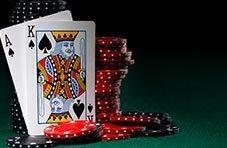Enjoy your time at Springbok Casino
Online Blackjack for Dummies

So you’ve played a couple of hands and fallen in love with the sweet little thing called Blackjack? We totally get it, it has happened many times to many other people. Apart from being tons of fun, Blackjack is a relatively simple game with low house advantage.
But once you’ve moved past the most basic rules, you might have realised there are terms you don’t understand and are not sure how to manage. If you’re one of the newcomers struggling to grasp the meaning of Split, Double, Insurance or Surrender, keep on reading!
Split
In most Blackjack variants, when your first two cards make a pair, you’ll have the option to split them and create two new hands. When you do, the dealer will deal you two more cards, one for each of these hands, and your bet will double. What has happened is simply that instead of a single hand you’re simultaneously playing two, each with the same stake as the one you originally put on the table.
Knowing when to split is an important decision and the related rules are fairly easy to memorise. Always split a pair of Aces or a pair of Eights. Why? When you’re holding an Ace, there’s a good statistical probability of hitting a 10-value cards (and therefore scoring 21) as there are more of those in the deck than any other card. If you’ve been dealt two 8’s, you’re playing with a hand of 16 which is considered poor and rarely wins, so you’ll be better off taking your chances and separating them. Pair of 10’s is best left alone; while splitting Aces and 8’s improves your chances, it’s not likely that doing the same with 10’s will make your hand any better.
Where all other pairs are concerned, stick or split decision changes based on the dealer’s up card. If you’re still a beginner, you might want to start off with the simple rules stated above. If you absolutely want to learn more, here it is. Stick with the pair of 9’s if the dealer holds 7, 10-value card or an Ace, and split in all other situations. It would be advisable to split 6’s when they show a card between 2 and 6, and two 7’s should be separated when the dealer’s up card is between 2 and 7. If you’re holding 4’s and they play with 5 or 6, split, otherwise hit. A pair of 2’s and a pair of 3’s should be split when your opponent has any card between 2 and 7.
Double-down
Doubling down is another interesting Blackjack feature. What it actually means is that, having received your initial two cards, you’re being offered an option to double your initial bet. Why would you want to? Because you’re holding a “strong” hand and want to win more. This is considered to be “the most statistically advantageous” play when your first two cards equal 11 or 10, again because of the fact mentioned above: since there are 16 different 10-value cards in a deck, you’ve got a 30.7% chance of getting one of them and hitting 21. Why would the casino allow you to do it? Because they’ll try to impact your hand by allowing you to receive only one additional card.
So, what if your initial cards total something else? It’s usually advised that in case they make more than 11, you shouldn’t double down, unless you’ve got reason to believe the dealer will go bust. An indicator that they might is a 5 or a 6 up card, also known as “bust cards”.
Insurance
Insurance is basically a side bet, offered as a way to protect part of your stake in the event that the dealer hits a blackjack - meaning they immediately win and you lose, unless you’ve got the identical hand. You’ll be offered to take insurance in the event the dealer’s up card is an Ace. If you choose to do so, you’ll have to place a side bet which is half the size of your original stake. In case your opponent does show a blackjack, you’ll lose the initial bet and win 2:1 on the side bet – which in fact means you’ll come out even. If they don’t land a blackjack, you’ll lose your side bet and the game continues.
You’ll often see advice not to take insurance as long-term it doesn’t pay off, and generally this is a good advice. You might want to do it in a single situation, and that’s when you’re holding a blackjack yourself. Why? If both of you show the same highest hand, it will be a push and you’ll get your original wager back, winning nothing. Since blackjack hands are fairly rare, this might make you grit your teeth in frustration. If you do take an insurance, you’re guaranteed to win. Either the dealer will score, you’ll push on the initial bet and collect 2:1 on the insurance, or they won’t and you’ll win 3:2 on your blackjack.
Surrender
Surrender is an option which allows you to fold when faced with a bad hand, at the cost of half of your stake. Not all Blackjack games allow it, but you might want to use the opportunity to minimise your losses in those that do. So when should you consider giving up? The basic strategy advises as follows: surrender only if you’ve got a hard 15 and dealer holds a 10, or when your hand shows hard 16 and the dealer’s up card is 9, 10, or an Ace. That’s it!



